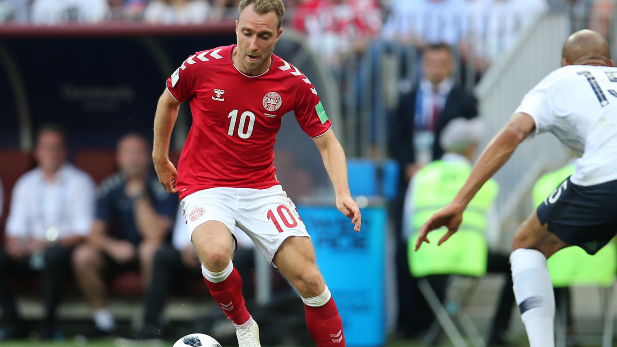World Cup Qatar: Why it is so hard to look away

By: Asbjørn Mølgaard Sørensen / Photo: Marco Iacobucci Epp/Shutterstock
Since Qatar won the rights to host the World Cup 2022 back in 2010, The Guardian has reported of 6,500 dead migrant workers and slave-like conditions during the construction of eight new stadiums in Qatar.
As the tournament unfolds on TV, Qatar’s views on homosexuality, equal opportunities and alcohol have also attracted much attention. Security guards have taken firm action on Danish journalists filming in the street or wearing the one love armband.
Even if watching this makes us feel bad, we still want to see the matches. According to a survey made by Voxmeter, 63 percent of danes are watching the world cup in Qatar.
Most of them do so while still being interested in the humanitarian situation in Qatar, says Battista Severgnini, associate professor at Department of Economics at Copenhagen Business School.
”There are several reasons for most Danes not to boycott the World Cup. First of all, football is simply the most captivating and addictive sport, and the World Cup is the biggest tournament. It is just too hard to live without,” he says.
The perfect mix of suspense and surprise
People constantly seek information – sometimes because we need it but often because of its entertainment value.
According to The American Time Use Survey, adults spend more than one fifth of their waking time entertaining themselves. And according to Battista Severgnini, football is nothing less than brilliant entertainment.
”Football is the perfect mix of surprise and suspense. It differs from other sports where the score keeps going up – such as tennis and basketball. In these kinds of sports, there is always an indication of who is the strongest player. However, in football there are very few goals, which makes it difficult to predict the winner. Anything can happen, and there is a constant level of suspense,” says Battista Severgnini.
Is it a matter of taste?
Battista is Italian and a fan of the 3rd division team Pergolettese. Having just seen Danish Holger Rune win Paris Masters, it is tempting to ask him about the subjectivity of claiming that football is more fascinating than other sports. But this has already been subject to research.
In a study in the Journal of Political Economy from 2015, researchers investigated football, tennis and blackjack, and it showed that football created a lot more suspense than the other categories. Suspense describes the somewhat disturbing feeling that everything can change instantly.
”We are curious by nature. We always want to know what happens next. So, football being this unpredictable ensures suspense throughout the game. We simply cannot look away. This Is very similar to when you’ve applied for a university. In that situation it is very hard not to check your e-mail constantly even though we know it will not affect the outcome.”
However, according to Severgnini, clearly, we prefer different kinds of sports and entertainment, but much of it depends on experience.
”We know that knowledge on the subject makes it more enjoyable to play or watch. If you know a lot about tennis, you will clearly be more attracted to it. Football is very simple to follow. So, when everybody does that – for instance in Denmark – we feel a common understanding and interest,” he adds.
Football is a large part of the Danish national feeling
In many countries, football is part of the national identity, and this goes for Denmark too. According to Battista Severgnini, this is another reason for the Danes having a hard time giving up the World Cup.
”Personally, it is much more difficult for us to boycott the World Cup than a tennis tournament. We leave a community and simultaneously – if we have qualms about watching the World Cup in Qatar – we feel less guilty watching it when everybody else does,” he says.
It is easy to find examples of football being of national significance in many countries. Recently, Saudi Arabia announced a new national holiday because of their win over Argentina in the World Cup 2022.
Hosting a sports tournament as the World Cup is never profitable
We do not see Qatar as a big sports nation. It is placed in a desert, and between May and September the temperature reaches more than 45 degrees, which is why the tournament takes place during the winter months. For the occasion, Qatar has built seven new stadiums and refurbished another one. Despite these great efforts, the western part of the world has demonstrated their dissatisfaction with Qatar winning the right to host the World Cup.
First, we heard about the terrible working conditions for the many migrants building the stadiums. Then, Qatar faced more criticism for not allowing people to kiss in public. Legislation on homosexuality and diversity became an issue, and a few days before the World Cup, Qatar withdrew their promise to sell beer to the World Cup audience during the matches.
So, considering a lot of bad press plus massive expenses, one is inclined to ask what Qatar will gain from hosting the World Cup?
”Hosting the FIFA World Cup is almost always a bad idea seen from a financial point of view. It is extremely expensive to build the necessary infrastructure, and the employment rate increase is not permanent. Even though it is expensive, and the protests have expanded, Qatar has managed to attract a lot of prominent guests. The whole world is looking at them right now,” says Battista Severgnini.
Traditionally, sports tournaments are a means to gain political goodwill, he believes.
”Politicians win from arranging sports tournaments because it is visible to the population. They remember it. Even if it is better to invest in a new hospital or new roads, people will not notice or remember to the same extent, As already mentioned, hosting a World Cup creates a national identity despite the huge costs,” Severgnini concludes.
